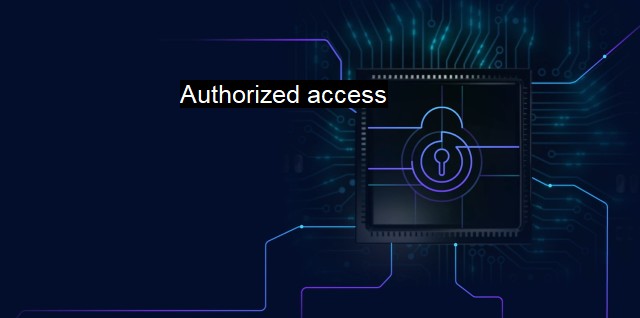What are Authorized access?
The Importance of Authorized Access for Cybersecurity and Data Protection in Business Infrastructure
Authorized access in the realm of cybersecurity and antivirus refers to the explicit permission given to individuals or systems to access and interact with certain computer systems, networks or files. it is the method of ascertively allocating access rights and privileges to certain data or functions to specific users or computer programs.In the digital world, where huge amounts of information are processed and stored remotely or locally, protecting access to this information becomes a key concern. Authorized access helps in keeping these digital assets safe by allowing only approved entities (users or programs) to interface with them. To implement this, organizations often employ a gamut of security measures like access control policies, identity verification processes, and access control lists.
The principle of authorized access works on several dimensions – who needs access, what they need access to, and the level of access required. For instance, management personnel may need to access sensitive analytics data that normal employees do not, hence they would be given higher access rights. The transgression, exploit, or bypass of these authorized access points leads to breaches, making the data and applications vulnerable to threats and damages. One crucial outcome of this is the malicious infiltration of flawed or nefarious programs that distribute viruses, ransomware, or various forms of malware capable of compromising the integrity, confidentiality, or availability of the stored information.
In the realm of antivirus defense strategies, authorized access plays a pivotal role. Having an antivirus software meticulously scans and monitors a machine’s programs and applications. Yet, these antivirus tools also need to adhere to authorized access principles. For instance, they should only access system features, individual files or network components when explicitly given the rights to do so. Thus, while antivirus programs function to detect and eradicate malicious software, they should also be working within the purview of authorized access.
Implementing authorized access goes beyond setting login criteria for users. Individually assigning levels of access based on user roles, also known as Role-Based Access Control (RBAC), minimizes the risk in data management. systems continuously employ updated and sophisticated encryption methodologies as a way to secure data and prevent unauthorized access.
Further, efficient security measures like two-factor authentication, which combines something the user knows (like a password) and something the user has (like a hardware token or a fingerprint), enhances the integrity of authorized access. This significantly raises the difficulty for unauthorized entities to infiltrate the system.
Likewise, techniques like session timeouts and automatic log-offs also augment the robustness of authorized access. If a session is left unmaintained or active with long intervals of inactivity, they are automatically logged out, incinerating possibilities of unauthorized access in the event of unattended machines.
Authorized access is a dynamic, multifaceted approach to cybersecurity. Implementing proper access control measures is a critical aspect of maintaining the confidentiality, integrity, and availability of computer systems and networks. In addressing justified access to antivirus systems and maintaining their effectiveness, it likewise bolsters the protection of digital environments against potential threats. Therefore, mastering the art of authorized access paves the way to a solid digital barrier, capable of making business operations and personal data secure in the cybernetic realm.

Authorized access FAQs
What is authorized access in cybersecurity?
Authorized access in cybersecurity refers to the access granted to an individual or entity to a particular system, network or data. This access is granted based on pre-defined rules, policies, and permissions. It is essential to ensure that only authorized individuals have access to sensitive and confidential data to prevent unauthorized access and data breaches.What are the benefits of authorized access in cybersecurity?
The benefits of authorized access in cybersecurity are plenty. It helps to prevent unauthorized access to sensitive and confidential data, protects the system or network from malware, viruses, and cyber-attacks, and ensures compliance with regulatory requirements. Authorized access also helps to track user activity and identify any unusual or suspicious activity, thereby preventing potential security breaches.What are the consequences of unauthorized access in cybersecurity?
The consequences of unauthorized access in cybersecurity can be significant. It can result in the theft or loss of sensitive data, causing financial loss or damage to the reputation of the organization. It can also lead to ransomware attacks, malware infections, or data breaches, resulting in legal repercussions and regulatory fines. Unauthorized access can also compromise the integrity and availability of critical systems, leading to business disruption and downtime.How can antivirus software help to prevent unauthorized access in cybersecurity?
Antivirus software plays a crucial role in preventing unauthorized access in cybersecurity. It helps to detect and remove malware or viruses from the system or network, preventing unauthorized access by cybercriminals. Antivirus software also helps to monitor user activity and identify potentially malicious behavior, thereby preventing unauthorized access attempts. It can also provide real-time threat detection and prevent unauthorized access to sensitive data or critical systems.| | A | | | B | | | C | | | D | | | E | | | F | | | G | | | H | | | I | | | J | | | K | | | L | | | M | |
| | N | | | O | | | P | | | Q | | | R | | | S | | | T | | | U | | | V | | | W | | | X | | | Y | | | Z | |
| | 1 | | | 2 | | | 3 | | | 4 | | | 7 | | | 8 | | |||||||